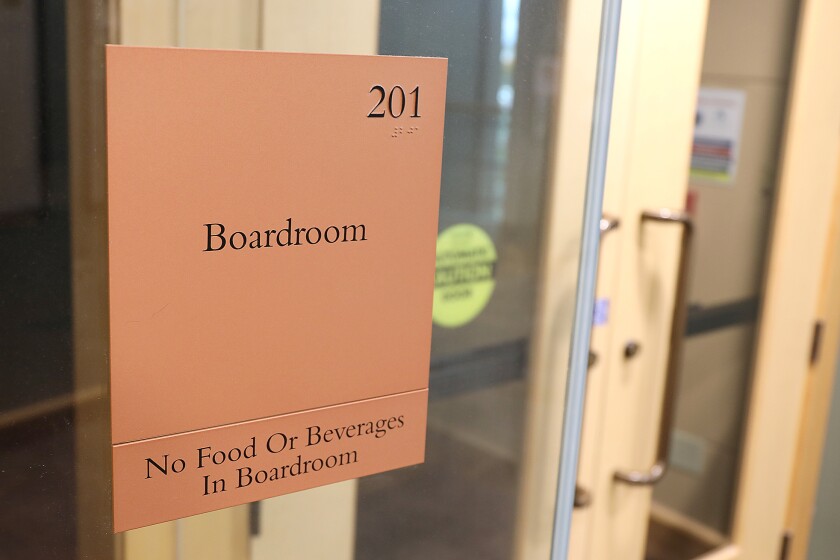SUPERIOR — Douglas County employees will be paid more in 2023 after a wage market update revealed more than half of all county workers earn less than market-rate wages.
The county’s administration committee approved a plan Thursday, Aug. 4, that will eliminate the lowest pay grade, alter salary ranges, and expand room for growth within individual positions to keep the county competitive in the labor market.
The study revealed that the most affected positions include highway workers, technicians, jailers and dispatchers, said Malayna Halvorson Maes, a senior consultant with McGrath Human Resources Group, which conducted the study.
Since October, the county has increased wages for jailers; created incentives for jailers and dispatchers; fielded complaints from highway workers who sought increases to their wages; and adjusted wages for seasonal highway workers in an effort to find enough people fill available job openings and keep workers from vacating positions.
“Every employee should see a pay increase,” county administrator Ann Doucette said. She said the minimum pay increase will be about 2%, but most will see a 2.5% increase. Those on the lower end of the pay scale could see as much as a 16% increase, which would take Douglas County’s lowest paid workers from $16 per hour to $17.41 per hour.
ADVERTISEMENT
No one working for Douglas County would earn less than $17.41 per hour under the new pay plan.
The plan does leave lower salary ranges in the pay plan for entry-level jobs; however, no existing position in the county is included in those ranges. Halverson Maes said the lowest pay range was eliminated entirely.
Halvorson Maes said the new pay plan shifts lower paid grades F-K so step four becomes the new step one, while higher paid positions, grade L-V, start at step three for the new step one in the salary range. She said the lower paid grades, which include highway staff, technicians, jailers and dispatchers, are being adjusted by 7.5%, while higher pay grades were adjusted by 5% for the starting wage.
The plan also adds five additional steps, 7-11, with a minimum 1% increase annually for employees who have worked their way through the six steps of the original pay plan.
"No employees are going to be in steps 7-11 this go-around," Halvorson Maes said. "… What I'm going to do is ask you to evaluate your financial ability is going to be to increase those step percentages above 1%. You don't need to go above 2% but I would like it if you could be above 1%. This is all going to be based upon what your fiscal ability is long-term. I don't want to create steps for you that are not going to be fiscally sustainable over a long period of time."
The new wage plan puts Douglas County in the middle of small, rural counties with lower wages and leaders in the wage market, Halvorson Maes said.
"Unfortunately, they're still going to go across the border and they're likely to earn more than what Douglas (County) is going to pay," Halvorson Maes said.
The finance department calculated the cost of the changes, Doucette said, including the cost of health benefits and came up with a total cost of $568,000 to implement the changes. She said that about half the salaries get reimbursed by the state through various programs so the cost to Douglas County would be about $300,000.
ADVERTISEMENT
With the administration committee's approval, the plan moves to the Douglas County budgeting process to determine if the county can afford the new wage plan in 2023.
"What we consider to be market competitive today is not necessarily what we considered to be market competitive two years ago," Halvorson Maes said. "The market is absolutely changing, and it is very, very competitive right now. And because of that, organizations are needing to bring their people in a little bit closer to average market because they have many opportunities and they're going to go elsewhere. They're less inclined to wait to progress through a salary range."
Social work incentives
The administration committee also approved an incentive program for social workers and case managers that would go into effect at the end of August.
Under the program, employees would be eligible for incentives that would be paid through Dec. 1.
Hourly wages would increase by 1.5% for those employed at the beginning of the Aug. 28 pay periods, and employees still on the payroll at the beginning of the Dec. 4 payroll would move to the next step on the wage scale.
The incentive program, expected to cost the county $11,402, would be paid for using funding from wages not spent after employees left the department, said Joan Finkler, who handles the department’s finances. She said 14 people have left since the 2022 budget was implemented.
Doucette said the incentive program is unlikely to have a major impact on implementing the county’s new wage plan. She said some employees would just be at a higher step.
The county board will consider the incentive plan when it meets Aug. 18.










